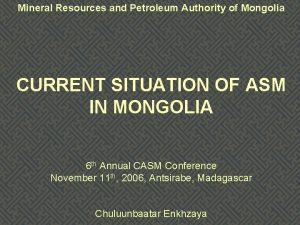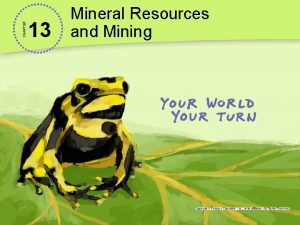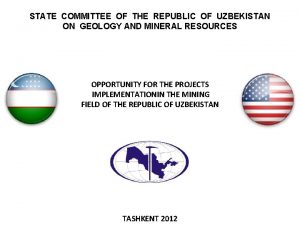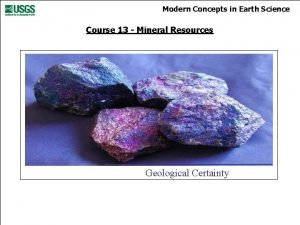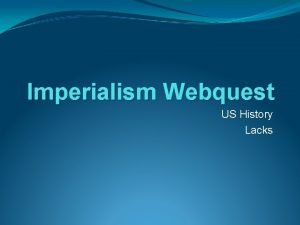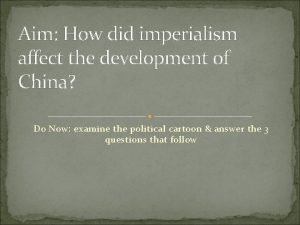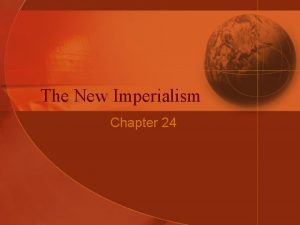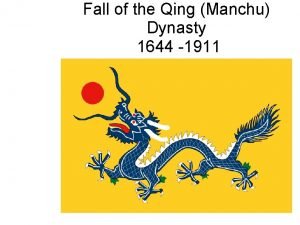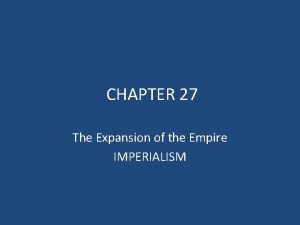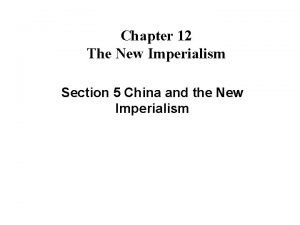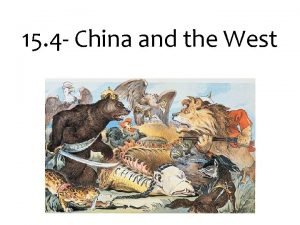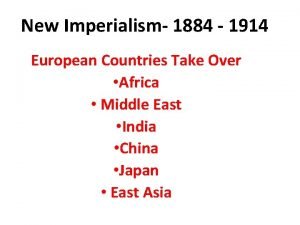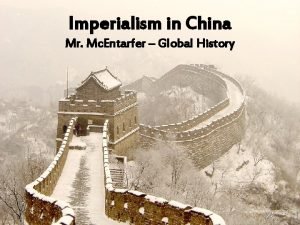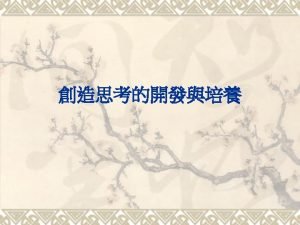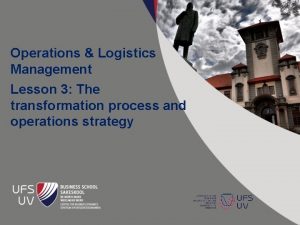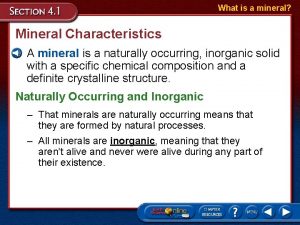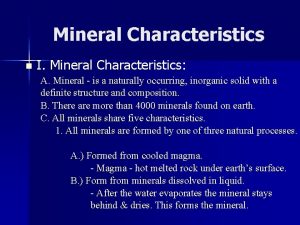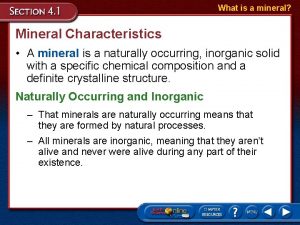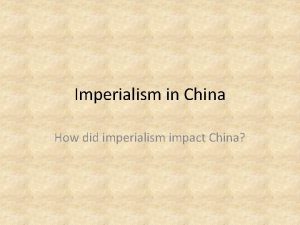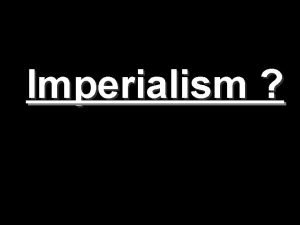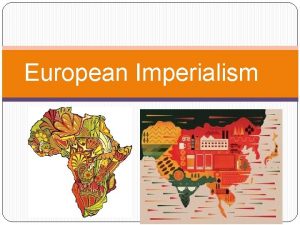Imperialism in China China Why China Mineral resources
























- Slides: 24

Imperialism in China

China

Why China? • Mineral resources • Had silk, tea & porcelain Europeans want these things & China was the only place they could get them! • Large market to sell goods to Europeans have lots of goods to sell due to the Industrial Revolution (think: machines are now – QUICKLY – making

Why China? • No strong military Many European nations have a strong military • Ethnocentrism – belief in the superiority of one's own ethnic group – China is isolated & they don’t know anything about other cultures

China’s Economy • Self sufficient agricultural & mining economy • Successfully fed 300 million people • Had raw materials that Europeans wanted: sugar, ginger, silk, porcelain, tea Remember: Europeans are imperializing because they

China’s Economy So…. what does Britain have that China wants? NOTHING!!!!!

The British in China • British import millions of pounds of tea from China • They’re buying a lot, but not selling a lot… HMMM…what can I SELL to the Chinese in order to make money? !

The British in China OPIUM!!

Opium • Grown in India – Britain’s other colony • Highly addictive

Opium • British flood China with opium • 1835 – 12 million addicted to smoking opium

Opium • Opium causes moral, social, political & economic problems for China “By what right do they [British merchants]… use the poisonous drug [opium] to injure the Chinese people? . . . I have heard that the smoking of opium is very strictly forbidden by your country; that is because the harm caused by opium is clearly understood. Since it is not permitted to do harm to your own country, then even less should you let it be passed on to the harm of other countries. ”

Opium War (1839 – 1842) • Chinese Government: – Bans all trade in opium – Destroy stockpile of opium in a warehouse

Opium War (1839 – 1842) • British response: – Send warships! • Remember – Britain has a STRONG NAVY! • Mostly fought at sea • Chinese navy could not compete with British Navy – Cannons & steam powered gunboats

Treaty of Nanjing 1842 **TREATY TO END OPIUM WAR** • Results: – China forced to open 5 ports for trade – Gave Britain the Island of Hong Kong • Returned in 1997 – China had to pay for destroyed opium

Treaty of Nanjing 1842 • Results (con’t) – British merchants & British government officials to live in these new port cities EXTRATERRITORIAL RIGHTS: – exemption from Chinese law in certain port cities

Treaty of Nanjing 1842 • Unequal treaty • Other nations (France, Russia, Germany, & Japan) forced China to sign treaties granting them the same trading rights as Britain spheres of influence - area in which a foreign nation controlled trade & investment


Open Door Policy 1899 • United States – Afraid that they would be left out of China – Were not part of the spheres of influence • Open Door Policy – all foreign nations were to enjoy equal trading rights in China – Protects American trading rights – Prevents China from becoming fully colonized

HEADS UP! European countries & the US never “take over” China, they just economically and politically dominate China!

Boxer Rebellion 1890 “Boxers” are part of the society of harmonious fists • Causes: – Unrest due to China’s inability to defend against imperialism – Empress thought of as corrupt & not helping to improve peoples’ lives

Boxer Rebellion 1890 • Causes (con’t) – Chinese resented extraterritorial rights • Special privileges given to foreigners – Resentment towards Chinese Christians, who were protected by missionaries


Boxer Rebellion 1890 **The Boxers’ Goal: to drive out foreigners from China** • Surrounded the European section of Beijing & held it under siege for several months • A multinational force of 20, 000 troops (British, French, German, Austria, Italy, Russia, Japan, & US) put down the rebellion • Again, European superior weapons are to blame for the loss

Connection… Question: How are the Boxer Rebellion & the Sepoy Mutiny similar? Answer: Both opposed European imperialism & wanted to end foreign domination of their country
 Hey bye bye
Hey bye bye New imperialism motives
New imperialism motives Old vs new imperialism
Old vs new imperialism Minerals of karnataka
Minerals of karnataka Mineral resources and petroleum authority of mongolia
Mineral resources and petroleum authority of mongolia Mineral resources and mining chapter 13
Mineral resources and mining chapter 13 Uzbekistan mineral resources
Uzbekistan mineral resources Mississippi mineral
Mississippi mineral Portfolio committee on mineral resources and energy
Portfolio committee on mineral resources and energy Mineral resources
Mineral resources Economic causes of new imperialism
Economic causes of new imperialism European imperialism webquest
European imperialism webquest China imperialism cartoon
China imperialism cartoon Chapter 24 section 5 china and the new imperialism
Chapter 24 section 5 china and the new imperialism Chinese old hairstyle
Chinese old hairstyle China and imperialism
China and imperialism Chapter 12 section 5 china and the new imperialism
Chapter 12 section 5 china and the new imperialism Western imperialism in china
Western imperialism in china Imperialize synonym
Imperialize synonym Global history imperialism in china
Global history imperialism in china Don't ask why why why
Don't ask why why why Bosnian crisis cartoon
Bosnian crisis cartoon What is the transformation process
What is the transformation process Example of fixed resources
Example of fixed resources Renewable vs nonrenewable resources worksheet
Renewable vs nonrenewable resources worksheet




